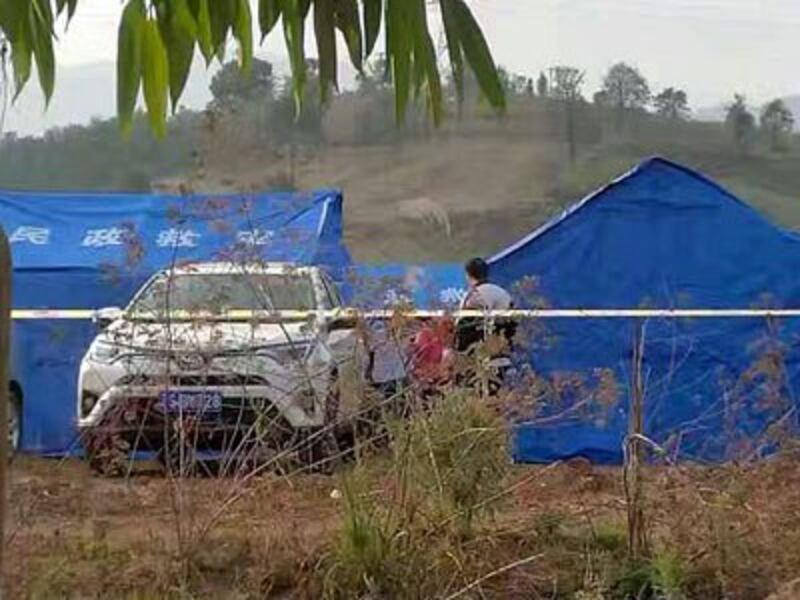A Chinese national has died and several more have been injured by shelling from intense fighting between government troops and ethnic insurgents in northern Myanmar, local sources told RFA.
The man died near the No. 125 border marker following shelling by the Myanmar army at around 4 p.m. local time on Thursday, sources said.
The victim, identified only by his surname Yang, was shown in photos sent to RFA by eyewitnesses, shortly before his body was collected by the Chinese authorities.
Fighting between Kokang fighters and government forces in Myanmar’s volatile northern Shan state have left broke out early Monday when 30 soldiers from the Myanmar National Democratic Alliance Army (MNDAA), the formal name of the Kokang rebel army, attacked police and military posts and civilian buildings, leaving about 30 people—police, civilians, and insurgents—dead.
A volunteer working in the Yunnan border town of Nansan surnamed Wei confirmed the report, saying that clashes have intensified further this week.
"There are still shells landing on the Chinese side of the border, and some people have been killed and others have been injured in the explosions. One Chinese person has died," Wei said.
"The Myanmar government troops have been absolutely crazed this time," he said.
A volunteer surnamed Cai said the fighting is particularly fierce near the border checkpoint at Nansan.
"It goes on intermittently during the day; there are a few shells per hour," she said. "Maybe three or four homes have been hit because they are close to the border crossing. There are more troops around than normal, and they are patrolling 24 hours a day."
She said an estimated 10,000 refugees are currently crowded into Nansan township, with a number of voluntary teams operating to find them food and shelter.
"They started coming over in groups on March 8; now there are 10 or 20 thousand people fleeing [the fighting],” Cai said. “They are getting basic food and shelter provided by the Chinese government.”
"Some Kokang residents have also set up their own organizations; they've formed a lot of teams to help them out, too," she said.
"The majority have been able to access basic assistance," she said.

‘Too dangerous’
Fighting between Kokang rebels and Myanmar troops in Laukkai in northern Shan state has forced a wave of more than 20,000 refugees across the border into China.
A resident of Nansan told RFA on Friday that the schools have yet to reopen after being closed on Wednesday.
"The fighting is still going on, and the schools are still closed," the resident said. "We can still hear gunfire and shelling, and we dare not go outside."
"If civilians go to the border, the police and the military turn them away and won't let them watch," he said. "It's too dangerous."
He said the majority of refugees are camping out in tents in the vicinity of the No. 125 border marker.
"The government has put up disaster relief tents for them to stay in," he said. "I'm not sure how many there are, but there are about 70 or 80 areas set aside for refugees."
Meanwhile, an ethnic Chinese resident of Kokang surnamed Lu told RFA that several buildings in Nansan were damaged in the shelling.
"There is a big hotel in Nansan, which had its windows shattered when a shell landed there; several shells landed over here," Lu said. "Nansan is very, very close to the border."
"In the place where the fighting is, you can have one foot in China and the other in Myanmar," she said.
"The fighting is literally on the border between the two countries, and it spills over here," she said.
Lu said Kokang is now pretty deserted, with stores shuttered up and nowhere open for business.
She said she is hoping to be able to return to Myanmar and carry on with her life as soon as possible.
An official who answered the phone at the Nansan township government on Friday declined to comment.
"Sorry, I can't tell you anything. Those are the rules," the official said.
"This is all classified information, so there's nothing I can do about it," he said.
Repeated calls to the Chinese embassy in Myanmar rang unanswered during office hours on Friday.
Chinese foreign ministry spokesman Geng Shuang called on all parties to exercise restraint in the conflict, but made no mention of any deaths in the border region.
Reported by Qiao Long for RFA's Mandarin Service, and by Wong Lok-to for the Cantonese Service. Translated and written in English by Luisetta Mudie.
